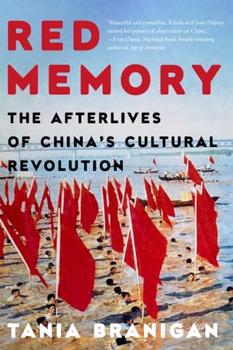Summary | Excerpt | Reviews | Beyond the Book | Readalikes | Genres & Themes | Author Bio

The Afterlives of China's Cultural Revolution
by Tania BraniganPROLOGUE
These two matters are not finished, and their legacy must be handed down to the next generation. How to do this? If not in peace, then in turmoil ...
Mao Zedong, in his last months,
on the Cultural Revolution and forcing the
Kuomintang to retreat to Taiwan
Ice sealed the lakes at the heart of the city and colour had leached from the streets and skies, smog dissolving into cloud: the horizon was just a memory. The ginkgos in the park were ink tracings now. Pet dogs wore thick jumpers this morning, and had scuttered past with a stony resolve I recognised. Though I was indoors again, still swathed in layer on layer of wool, the cold continued to insinuate itself. Soon it was bone-deep. These industrial buildings to the north of Beijing, once used to manufacture armaments, were beloved by artists for their bare concrete walls, lofty ceilings and expanses of glass, all of which contributed to the studio's mortuary chill.
I'd heard that the paintings were large, but that hadn't prepared me. Each was two and a half metres high and, hung on the walls, dwarfed me further, so that I was the one under scrutiny. At this scale, and monochrome, even smiles were somehow sombre. On first sight, the images were almost photographic. These faces had the same fated quality as pictures of missing children, as if they too anticipated what I knew awaited them. Step closer and the clear lines scattered into a flurry of brushstrokes; smeary blotches and swipes of ash and charcoal. The pictures both dominated and eluded. The paint was thick, encrusted on the canvas and stuck here and there with bristles. I stepped back again and recognised some of the faces inspecting me. A celebrated author, behind heavy glasses. A glowering actress. Communist heroes. Others were unfamiliar. Famous, infamous or unknown, all were painted in precisely the same way, at the same immense scale. There was tragedy here, and villainy too, but the painter drew no distinctions: 'Even if they are bad people, they are still people,' he said.
He was an unassuming man, bundled in a fat black vinyl jacket and marmalade-coloured sweater – an outfit a student half his age might have worn, but which he carried off easily. He drew on cotton gloves to hunt through the stacks for the canvas I'd requested, then pulled out a frame and bore it to an easel before untaping the cover. A face emerged, unyielding, though with a trace of a smile: benign? Triumphant? Chairman Mao gazed out, and I gazed upon him. I was used to him in grand dimensions, from the giant portrait that still hung on Tiananmen, the great red gate in the capital's heart. It was startling that the others matched him as I looked around. There were over a hundred pictures in all, but one was missing, Xu Weixin told me: the very first portrait he had drawn, as a child. He had grown up in China's far north-west. He had liked his gentle teacher, Miss Liu, so was shocked and shamed when it all erupted and he learned of his naivety – she was, they warned him, a class enemy: the daughter of a landlord. Outraged at the discovery, he steeled his heart and did the right thing, used his pen, pinned the hideous caricature to the blackboard, and still remembered, as if it were this morning, the moment she walked in and saw it, and how the blood drained from her face. She understood already what it might mean, what might follow. He was too young, but grew up fast. Soon he would see them burning pictures and breaking Buddhas, beating people with sticks and metal bars. He would hear the screams, and listen to the silences that followed.
He didn't dwell upon his tale, though his memories were 'very, very vivid'; he outlined it efficiently. 'You were eight ...' I began. I was only checking the details, but he took it for a different kind of question, about his culpability, or perhaps a reassurance he hadn't wanted.
Excerpted from Red Memory by Tania Branigan. Copyright © 2023 by Tania Branigan. Excerpted by permission of W.W. Norton & Company. All rights reserved. No part of this excerpt may be reproduced or reprinted without permission in writing from the publisher.
Your guide toexceptional books
BookBrowse seeks out and recommends the best in contemporary fiction and nonfiction—books that not only engage and entertain but also deepen our understanding of ourselves and the world around us.